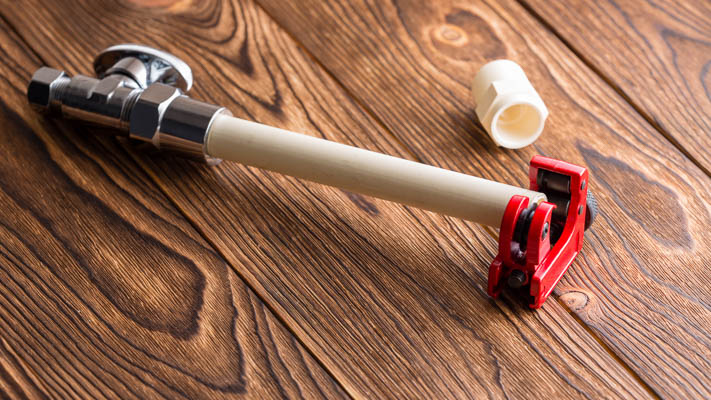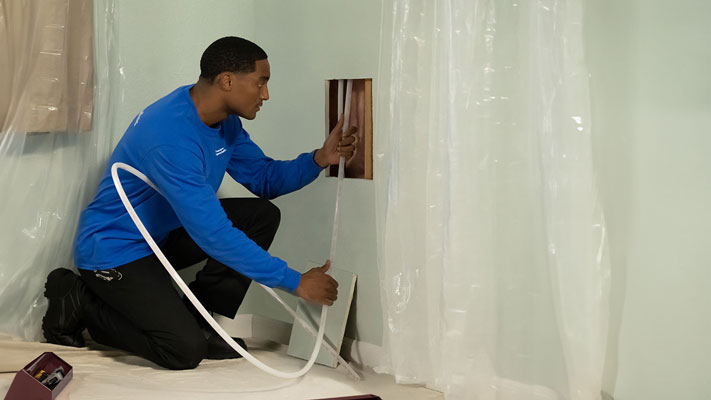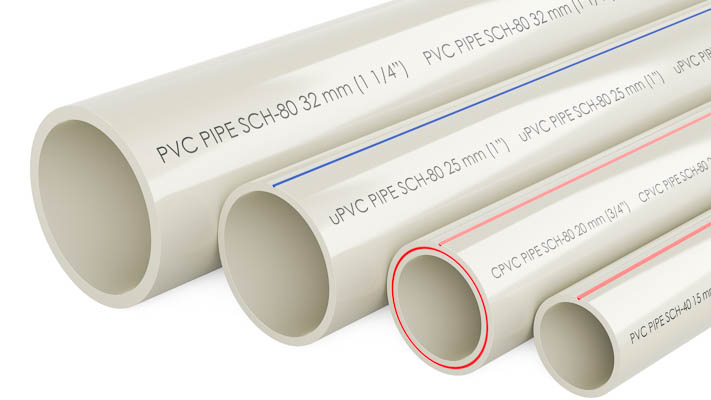What Are PVC and CPVC Pipes?
CPVC (Chlorinated Polyvinyl Chloride) and PVC (Polyvinyl Chloride) are both thermoplastic materials used in plumbing systems. Let's break them down for you:
PVC Pipes
PVC (Polyvinyl Chloride) pipes are widely used for cold water applications. Known for being lightweight, rigid, and affordable, PVC pipes are commonly found in irrigation systems, drainage systems, and cold water supply lines. They are highly resistant to corrosion, making them a durable choice for these purposes.
One of the key benefits of PVC is its ease of installation. However, PVC has a lower heat resistance compared to other materials, with a maximum temperature rating of around 140°F. Because of this limitation, it is not suitable for hot water systems, as it can deform or degrade under high temperatures.
CPVC Pipes
CPVC (Chlorinated Polyvinyl Chloride) pipes are a modified version of PVC, treated with chlorine to enhance their heat resistance. This makes CPVC pipes suitable for hot water applications, as they can handle temperatures ranging from 180°F to 200°F.
As a result, CPVC is commonly used in residential plumbing systems for showers, faucets, and water heaters, as well as in commercial systems requiring both hot and cold water distribution.
CPVC pipes also feature a smooth interior surface, which helps minimize friction and reduces the risk of clogs and blockages. For more information, read our article: What Is CPVC Piping?
How Are PVC and CPVC Pipes Different?
While PVC and CPVC are often confused due to their similar appearance and material base, they are designed for different applications. Here's a list of their key differences:
- Temperature Resistance: The primary distinction lies in temperature tolerance. CPVC can handle higher temperatures, making it ideal for hot water systems. PVC, on the other hand, is limited to cold-water applications due to its lower heat resistance.
- Flexibility and Durability: CPVC is slightly more flexible than PVC but can become brittle over time, especially when exposed to UV rays. PVC, while more rigid, tends to be more durable in colder environments.
- Installation and Cost: Both types of pipes are easy to install, but PVC is generally cheaper. CPVC is slightly more expensive because of its enhanced heat resistance.
- Incompatibility: CPVC and PVC pipes are not compatible with each other and should not be used together in the same plumbing system. Connecting CPVC and PVC can lead to leaks or joint failure due to differences in their chemical composition and expansion rates.
While PVC piping is typically used for cold water supply lines, drainage systems, and non-pressure applications such as irrigation, CPVC piping is more commonly used in residential and commercial plumbing systems for hot water distribution.
As a home repipe company, we will focus on CPVC for the remainder of this article, as it is more commonly used for fresh water lines in residential homes.
What Are Common Problems with CPVC Pipes?
Although CPVC has been a popular choice for residential plumbing systems, it does exhibit several common problems over time, such as:
- Brittleness: Over time, CPVC can become brittle, particularly if exposed to prolonged sunlight or high heat. This brittleness makes it prone to cracks or fractures, which can lead to leaks and water damage.
- Chemical Degradation: While CPVC is resistant to many chemicals, it may deteriorate when exposed to aggressive chemicals or solvents. This can weaken the pipe structure and increase the likelihood of leaks.
- Thermal Expansion: CPVC pipes are more susceptible to the effects of thermal expansion compared to metal piping materials. This can cause stress on joints and fittings, potentially leading to leaks over time, especially during significant temperature fluctuations.
- Joint Failures: Most CPVC pipes are connected with adhesive. Over time, these joints can loosen, particularly when exposed to chemicals or temperature changes, resulting in leaks and system failures.

If your home uses CPVC pipes and you're experiencing frequent issues like leaks or cracks, it might be time to explore a more durable alternative. If you're unsure whether you have CPVC pipes, there are a few quick and easy ways to check your home's plumbing.
Get your free estimate today
With over 75,000 repipes completed, we've perfected our One-Stop Repipe™ for your home.
What Is a Good Replacement for CPVC Pipes?
If you're considering replacing your CPVC pipes, you're not alone. Thankfully, there are alternatives that offer better durability, flexibility, and long-term performance for your plumbing system.
PEX Tubing: The Best CPVC Replacement
Cross-linked Polyethylene (PEX) is one of the most popular replacements for CPVC. We have an article dedicated to why PEX is the best replacement for CPVC pipes.
PEX's high flexibility allows it to be installed around obstacles without requiring numerous joints or fittings, which reduces the risk of leaks. Unlike CPVC, PEX is resistant to freezing and expansion, making it an ideal choice for colder climates. It is also more durable in the long run, with a typical lifespan of 50 years or more.

Replacing CPVC with PEX is a smart investment for your home. It can reduce the frequency of repairs, increase your system's lifespan, and improve the overall performance of your home's fresh water lines.
Contact us to receive a free, fixed-price repipe quote from one of our local repipe consultants.
Receive a Free Quote for Replacing Your CPVC Pipes
Here at Repipe Specialists, we've fully replaced CPVC in many homes across the USA using PEX tubing. We continually get positive customer feedback from customers about their whole home repipe experiences. We often exceed their expectations on:
- Speed: Our repipe crews typically complete a repipe in a day, returning on another day for wall patching.
- Convenience: Through our One-Stop Repipe™ Process, we handle everything from permits, to wall patching, to inspections.
- Cleanliness: Our crews are trained to protect your home while working (we cover all surfaces with protective sheeting), and to clean up fully at the end of each day.
- Peace of Mind: Repipe Specialists is a fully licensed plumber in every state we operate in, and we back all of our repipes with a lifetime warranty.
- Financing programs: To help take the sting out of unplanned repipe expenses, we offer several financing programs.
- Price: As a specialist that performs hundreds of repipes a week, we can deliver high quality repipes at a lower cost vs generalist plumbers. Our quotes typically range from $4,500 to $15,000 depending on the size and complexity of your project. We have an article that covers repipe cost factors in detail.
Schedule a free in-home consult, and one of our local repipe consultants will explain all your repipe options and provide you with a written, fixed-price quote. Repipe your brittle CPVC pipes, use PEX.

